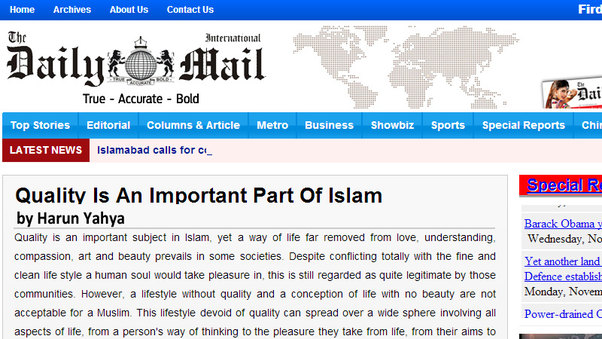
Quality is an important subject in Islam, yet a way of life far removed from love, understanding, compassion, art and beauty prevails in some societies. Despite conflicting totally with the fine and clean life style a human soul would take pleasure in, this is still regarded as quite legitimate by those communities. However, a lifestyle without quality and a conception of life with no beauty are not acceptable for a Muslim.
This lifestyle devoid of quality can spread over a wide sphere involving all aspects of life, from a person's way of thinking to the pleasure they take from life, from their aims to their sense of beauty and humor, their posture and what they eat and drink. When quality is not valued and when people have no understanding of concepts such as beauty, it is possible that the world might resemble hell for them. The importance of quality, cleanliness and fastidiousness are emphasized in the Koran.
God reveals that Muslims must employ all their means possible to live an immaculate life. Quality is therefore one of the most important features of Muslim communities. However, there are also Muslim communities in some parts of the world that are deficient in that regard, sometimes out of a lack of information and education and sometimes because they learn about Islam from their traditions, rather than from the Koran. Those circles seeking to make anti-Muslim propaganda generally portray those images as a "true Muslim model." That is why we often encounter pictures revealing this lack of quality in Muslims in many parts of the world on the television, in newspapers and in videos. These images are used for a specific purpose in order to lead the world into becoming falsely acquainted with Islam.
Therefore, what many people think of when the word "Muslim" is mentioned is a loveless and joyless model that rejects science and fails to understand art, has no sense of humanity, has no idea how to dress well and is far removed from modernity. A way of thinking that takes no pleasure in music, that takes a dim view of joyful people, that takes no care with regard to cleanliness, that is unkind and unaffectionate and that regards women as second or even third-class citizens may be regarded as embodying the basic features of a Muslim in many parts of the world. That perception naturally leads to unease and negative reactions in the world as a whole and encourages people to turn against Islam.
The fact is, however, that people react against a false perception of Islam in their minds, because of the false models they see, not against the true Islam. To the contrary of this incorrect understanding of Islam, God attaches great importance to quality in the Koran:
For example, Solomon's palace, adorned with precious ornaments and a transparent glass floor, refers to believers' inclination for arts and aesthetics. Again the horses caressed by Solomon indicate believers' love for animals. Mary, who is "chosen over all other women", reveals the importance attached to women. The Queen of Sheba, who is the leader of her people, shows that superiority according to gender has no place in Islam. Faith means love, compassion, affection, friendship, cleanliness, goodness and peace; it means embracing the poor, the orphaned, the needy and the elderly and everything created by God; people, plants, animals and all things. Such a superior moral understanding will, of course, bestow an enormous quality and excellence on all spheres of life and on people's thoughts and behavior. Therefore, Muslims who abide by these moral values are the highest-quality and noblest people in the world.
Quality must be accepted and recognized as an important part of being a Muslim and it must be understood that it is also required by the moral values of the Koran. Once quality is seen in art, science, politics and everywhere else in the Muslim world, the negative opinion of Islam that has grown up in some people will disappear of its own accord. Everyone wholeheartedly agrees with "a climate of pleasant conversation involving the highest possible levels of love, compassion, affection, friendship, democracy, good intentions, social justice, art and science." That is the essence of the true Islam; the finest conception of all these attributes exists in the moral values of Islam.
Muslims capable of understanding the beauty of these Islamic virtues have a great responsibility to speak out about these facts to the entire world. When this responsibility is accomplished, it will completely prevent non-Muslim societies from misinterpreting Islam and developing unnecessary prejudices and concerns regarding it and the world will draw much closer to peace and tranquility. Thus, societies with different beliefs and ideas will be able to live together in respect and understanding.
Adnan Oktar's article on Daily Mail:
http://dailymailnews.com/2014/02/07/columns-articles/1.php


